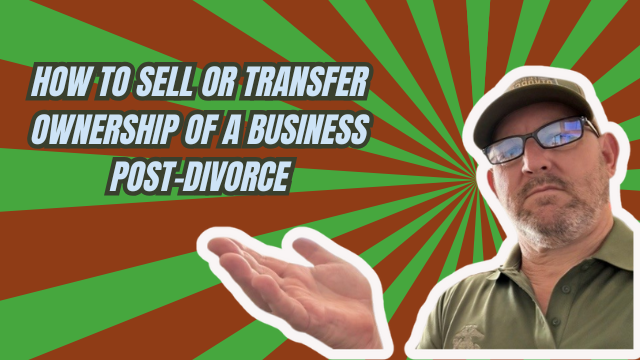What Happens If You Need to Sell a Business Post-Divorce?
Divorce affects every part of your life—and that includes any business you own. If you’re navigating a divorce and wondering how to handle selling a business that you and your spouse built or managed together, you’re not alone. Understanding the legal and financial steps involved can make this complex process smoother and less stressful.
In this article, we’ll break down what happens when you need to sell a business after divorce, especially in California, where community property laws come into play. We’ll also share a real client story to illustrate how a business sale can be managed amicably and fairly through proper planning and professional help.
Is Your Business Community Property?
One of the first and most important questions is whether your business is considered community property. In California, if a business was started or grew during the marriage, it’s typically classified as community property—even if only one spouse was actively involved day-to-day. This means both spouses may have a legal claim to the business’s value, regardless of whose name is on the paperwork.
This classification has significant implications for how the business is divided or sold during divorce proceedings. Recognizing that both parties have an interest in the business helps ensure a fair division of assets.
Key Elements to Include in Your Divorce Judgment
If selling the business is the agreed-upon path forward, the divorce judgment needs to clearly outline the entire process. Some critical points to cover include:
- Management of the Sale: Decide who will be responsible for managing and overseeing the sale process.
- Business Valuation: Agree on how the business will be valued. In most cases, a professional valuation is essential to ensure fairness.
- Handling Debts: Clarify who will be responsible for any outstanding debts or liabilities associated with the business.
- Division of Proceeds: Specify how the sale proceeds will be divided between spouses.
Having these details documented and court-approved helps prevent future disputes and ensures both parties walk away with a clear understanding of their rights and responsibilities.
Why Professional Valuation Matters
Determining the value of a business is rarely straightforward. A professional valuation conducted by a qualified business broker or appraiser provides an objective assessment of what the business is worth. This step is crucial because it:
- Protects both parties by establishing a fair market value
- Reduces the risk of conflict or disagreement over the business’s worth
- Provides an authoritative figure to support negotiations and court decisions
Without a professional valuation, one party could feel shortchanged or dispute the terms later, leading to costly legal battles.
Real Client Story: Selling a Business Without Conflict
Recently, we helped a divorcing couple who co-owned a small service business. Neither wanted to continue running the business post-divorce, so they agreed to sell. Here’s how the process unfolded:
- We coordinated with a business broker to conduct a professional valuation.
- The sale process was clearly documented and included in the divorce settlement.
- All necessary court filings were completed to formalize the agreement.
- Because everything was transparent and legally approved, there were no disputes.
- Both parties walked away with their fair share of the proceeds and peace of mind.
This example highlights how clear communication, professional guidance, and thorough documentation can turn a potentially tense situation into an amicable resolution.
How Divorce661 Can Help You Navigate Selling a Business After Divorce
At Divorce661, we specialize in helping couples through amicable divorces that involve complex assets like businesses, rental properties, and retirement accounts. Selling a business post-divorce requires coordination between attorneys, brokers, and financial experts. We provide:
- Expert coordination with business brokers, CPAs, and legal professionals
- Flat-fee divorce services that cover business sales and valuation
- Remote support across California, making the process convenient and efficient
- Clear, legally sound solutions that help you avoid future disputes
Our goal is to help you close this chapter with no loose ends, ensuring your business sale is handled fairly and your interests are protected.
Take the Next Step with Confidence
If you’re going through a divorce and considering selling a business, don’t try to figure it out alone. Having experienced professionals guide you through the legal and financial complexities can make all the difference.
Visit Divorce661.com to schedule a free consultation. We’ll help you understand your options, protect your interests, and make a clean break with confidence.
“Selling a business after divorce isn’t as simple as listing it and splitting the money. With the right process, you can avoid conflict and walk away with a fair outcome.” — Tim Blankenship, Divorce661




